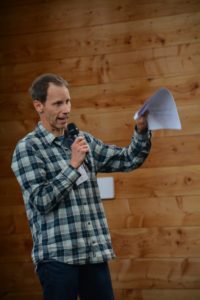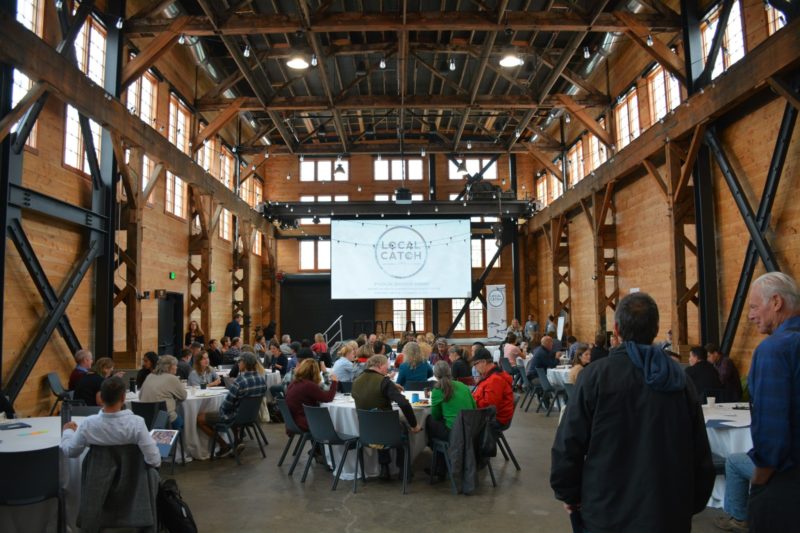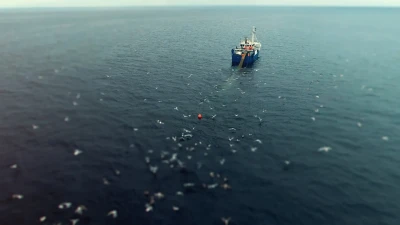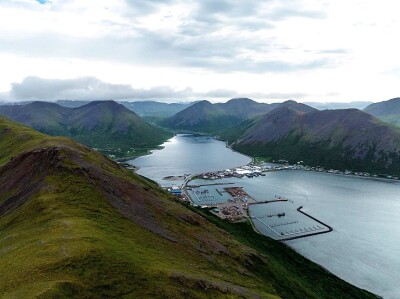Everyone was up early this Sunday. But it wasn’t to go fishing. It was to attend the third Local Catch Summit, an educational conference for entrepreneurial seafood folks in Portland, Ore.
This year was the first year the Local Catch Network has hosted an event on the West Coast (East Coast events include the 2012 National Summit on Community Supported Fisheries in Portsmouth, N.H., and the 2016 Local Seafood Summit in Norfolk, Va.). The summit aims to bring together harvesters and businesses interested in sharing experiential knowledge, learning strategies that make community supported fisheries and direct-marketing businesses successful.

Colle Stowell, director of the educational One Fish Foundation, speaks at the Local Catch Summit. Sam Hill photo.
Aside from a few committed folks involved with Local Catch who made the trek from the East Coast to support the summit, the majority of the 100-plus attendees were Pacific fishermen and seafood representatives connecting with the network for the first time.
This year’s series of workshops was focused on three tracks: The Business of CSFs; Marketing, Branding, and Developing Supply Chain Relationships; and Environment and Resilience.
While there is plenty of technical information surrounding direct-marketing, annual figures from successful CSFs and information on ocean climate trends being exchanged, the event primarily serves as an opportunity for like-minded folks to connect and share their stories.
“Every single person in this room has an important story to tell,” said Joshua Stoll, a professor of Ecology and Environmental Sciences at the University of Maine and a member of the Local Catch Summit steering committee. “Many of these stories are ones that people don’t necessarily know. And some of these stories have inspired the stories of others. But one of the pieces that connects us all, all of our stories, is an interest, an obsession, a focus on seafood production systems that anchor a set of values in our coastal communities.”
Willie Frank III of the Nisqually Tribal Council echoed those sentiments in his keynote address centered on his tribe’s long history of fighting for its civil and fishing rights in the Pacific Northwest.
“Today is a Sunday, most people go to church — for me, that is my church, being out on the river,” said Frank. “Being able to set that net, being able to still practice our treaty rights… It’s not so much about financial gain anymore — it’s about being able to put that net in the water and do what our ancestors did for thousands of years.”
https://twitter.com/WhoFishsMatters/status/1180915691895115777
To kick-off the summit, attendees were welcomed to take the stage and share an idea, challenge or project with everyone with the aim of connecting with someone else who might be able to lend a hand, some advice or just some encouragement.
Some are attending to learn more about launching a community-supported fishery business, while veterans of the model came to share their experiences. Fishermen came to find others attempting the daunting task of boosting marketing efforts for underutilized species while others wanted to learn more about how to harvest more popular species in the era of sustainability and climate change.
Writers, podcasters and filmmakers were also in attendance from Coastal Routes and Catch of the Day to listen and record the stories of fishermen looking to take the lead in their fisheries.
During his two-minute stand at the microphone John Foss (better known as Johnny Fishmonger), asked everyone in attendance to make a pledge: “I pledge to not buy or eat farmed salmon.”
The words echoed through the main hall of the Redd with no hesitation from the crowd.
https://twitter.com/seachanger/status/1180951133931466752
Of course, being less than100 miles from Astoria, it wouldn’t be a seafood gathering without a quick show from the FisherPoets. Rob Seitz reminded everyone of the lighter side of the fishing life with poems about about mounting the ‘ole 5-gallon bucket in rough seas and the difficulties of romancing your wife when she’s in charge or marketing your catch, while Marie Rose showed everyone how to connect with the sea, reading a poem explaining the beauty of fishing for wild salmon to a fishmonger who says their customers prefer farmed salmon.
In the afternoon, attendees broke off into new groups with newfound colleagues to attend more specific workshops and panels. Check back here for more.







